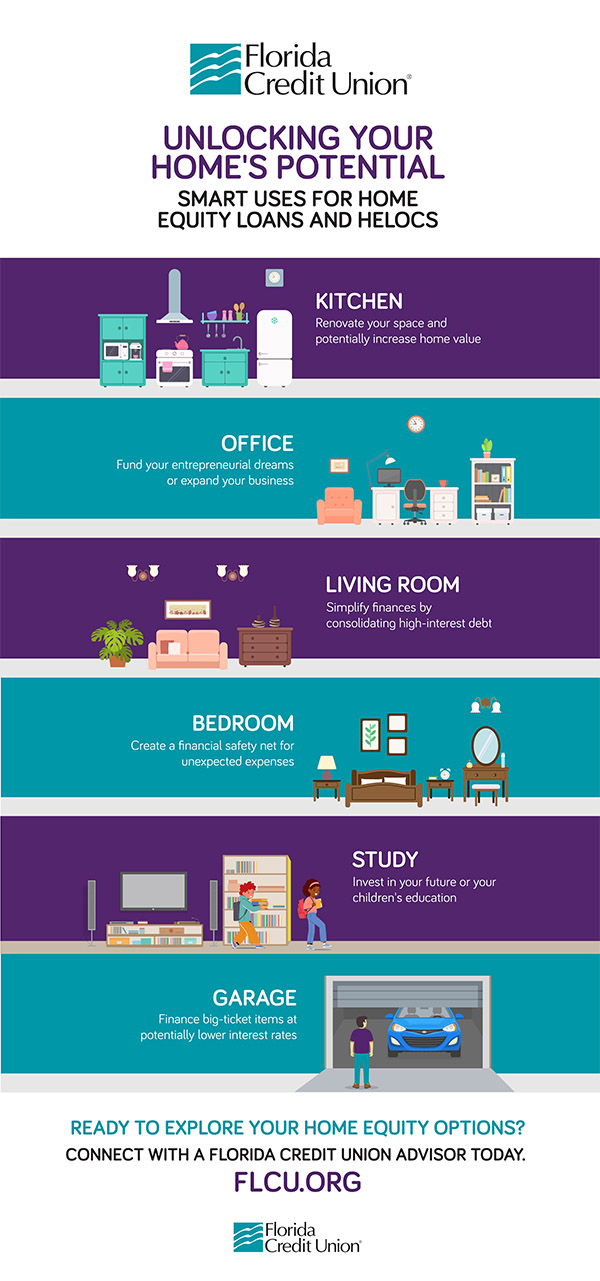A Beginner's Guide to Home Equity Loans and HELOC - What Are the Steps to Take Before Applying
8/29/2024
23 min. read
By: FCU Team

Have you ever considered tapping into your home's equity to finance a major expense or investment? If so, you're not alone. Many homeowners turn to home equity loans or home equity lines of credit (HELOCs) as powerful financial tools. But before you start dreaming about that kitchen remodel or paying off those credit cards, there's some important stuff you need to know. In this guide, we'll walk through the steps you should take before you even think about applying for a home equity loan or HELOC.
We'll cover everything from figuring out if it's the right move for you, to understanding the risks (because yes, there are some), to getting all your ducks in a row before you apply. By the end, you'll feel a lot more confident about whether tapping into your home's equity is the right choice for you.
Understanding Home Equity Loans and HELOCs
Home equity loans and HELOCs allow you to borrow against the equity you've built in your home. While they share similarities, they function differently. A home equity loan provides a lump sum with fixed interest rates, while a HELOC offers a revolving line of credit with variable rates. Both can be useful for home improvements, debt consolidation, or other significant expenses.However, applying for these financial products isn't a decision to be taken lightly. It involves careful consideration of your financial situation, understanding the risks involved, and thorough preparation.
Definitions
Home Equity Loan: A home equity loan, often called a second mortgage, allows you to borrow a lump sum against the equity in your home. The equity is the difference between your home's current market value and the amount you owe on your mortgage. These loans typically come with fixed interest rates and a set repayment period, usually 5 to 30 years.HELOC: A Home Equity Line of Credit, or HELOC, is a revolving line of credit using your home's equity as collateral. Unlike a home equity loan, a HELOC allows you to borrow money as needed, up to a predetermined credit limit, during what's called a "draw period." HELOCs usually have variable interest rates and are divided into two phases: the draw period (typically 10 years) and the repayment period (often 20 years).
Key Differences
- Disbursement: Home equity loans provide a lump sum, while HELOCs offer flexibility to borrow as needed.
- Interest Rates: Home equity loans usually have fixed rates, while HELOCs typically have variable rates.
- Repayment: With a home equity loan, you start repaying immediately. With a HELOC, you might only pay interest during the draw period.
Benefits and Potential Risks
Benefits:
- Lower Interest Rates: Both options generally offer lower interest rates compared to credit cards or personal loans, as they're secured by your home.
-
Potential Tax Deductions: Interest paid on home equity loans and HELOCs may be tax-deductible if used for home improvements (consult a tax professional for advice).
- Flexibility: These loans can be used for various purposes, from home renovations to debt consolidation.
- Large Loan Amounts: Depending on your home's value and your equity, you might be able to borrow substantial sums.
- Foreclosure Risk: Since your home is collateral, failing to repay could result in foreclosure.
- Decreased Home Equity: Borrowing against your home's equity reduces your ownership stake in the property.
- Temptation to Overspend: Credit availability might lead to unnecessary borrowing, especially with HELOCs.
- Market Fluctuations: If home values decline, you could owe more than your home is worth.
Common Uses for Home Equity Financing
- Home Improvements: Renovations can increase your home's value, potentially making this a strategic use of funds.
- Debt Consolidation: Paying off high-interest debts with a lower-interest home equity loan can save money over time.
- Education Expenses: Some homeowners use these loans to fund college tuition or other educational costs.
- Emergency Expenses: They can provide a financial safety net for unexpected large expenses.
- Business Investments: Entrepreneurs sometimes use home equity to fund business ventures.
Assessing Your Financial Situation
Before applying for a home equity loan or HELOC, it's essential to examine your current financial standing closely. This assessment will help you determine whether you're in a good position to take on additional debt and how much you might be able to borrow.Evaluating Your Current Debt and Income
Start by creating a comprehensive list of all your current debts and income sources. This should include:Debts:
- Mortgage balance
- Car loans
- Student loans
- Credit card balances
- Personal loans
- Any other outstanding debts
- Salary or wages
- Investment income
- Rental income
- Any other regular income sources
Calculating Your Debt-to-Income Ratio
Your debt-to-income (DTI) ratio is a key factor lenders consider when evaluating your loan application. It is the percentage of your monthly gross income that goes towards paying debts.To calculate your DTI:
- Sum up all your monthly debt payments
- Divide this total by your monthly gross income
- Multiply the result by 100 to get the percentage
($2,000 / $6,000) x 100 = 33.33%
Most lenders prefer a DTI of 43% or lower, though some may accept up to 50% for HELOCs. A lower DTI indicates a good balance between debt and income, and they are more likely to be able to take on additional debt responsibly.
Determining How Much Equity You Have in Your Home
Your home's equity is an important factor in home equity lending. To calculate your equity:Estimate your home's current market value (you might need a professional appraisal for an accurate figure) and subtract the remaining balance on your mortgage.
For example, if your home is worth $300,000 and you owe $200,000 on your mortgage, your home equity would be $100,000.
Lenders typically allow you to borrow up to 80-85% of your home's value minus your outstanding mortgage balance.
This is known as the loan-to-value (LTV) ratio. It's worth noting that while most lenders have these standard LTV limits, Florida Credit Union (FCU) offers more flexible options. FCU provides 100% LTV home equity loans and home equity lines of credit (HELOCs), allowing you to access more of your home's value. This can be particularly beneficial if you need to borrow a larger amount or build up less equity in your home.
Using the example above:
85% of $300,000 = $255,000
$255,000 - $200,000 (mortgage balance) = $55,000 potential borrowing amount
*This is a simplified calculation, and lenders will also consider other factors.
Understanding your financial situation through these assessments will help you decide whether a home equity loan or HELOC is right for you. It will also prepare you for conversations with potential lenders and give you a realistic idea of how much you can borrow.
Checking Your Credit
Your credit history plays a big part in your home equity loan or HELOC application process. It affects your approval odds and influences the interest rates and terms you may be offered. Explore why your credit is important and how to review it before applying.Importance of Credit History in the Application Process
Lenders use your credit history to assess your reliability as a borrower. A strong credit history demonstrates you've managed debt responsibly in the past, making you a lower-risk borrower. This can lead to:- Higher chances of approval
- Lower interest rates
- More favorable loan terms
- Higher borrowing limits
How to Obtain Your Credit Reports
You're entitled to one free credit report annually from each of the three major credit bureaus: Equifax, Experian, and TransUnion. To get your reports:- Visit AnnualCreditReport.com, the only authorized website for free credit reports (or access through your FCU Anywhere online banking portal)
- Provide the necessary information to verify your identity
- Choose which reports you want to access
Understanding Your Credit Score and Its Impact
Your credit score is a numerical representation of your creditworthiness, typically ranging from 300 to 850. The most commonly used model is the FICO score. Here's a general breakdown:- Excellent: 750+
- Good: 700-749
- Fair: 650-699
- Poor: 600-649
- Bad: Below 600
Your credit score is influenced by several factors:
- Payment history (35%)
- Credit utilization (30%)
- Length of credit history (15%)
- Credit mix (10%)
- New credit inquiries (10%)
Researching Lenders and Loan Options
Once you've assessed your financial situation and credit standing, it's time to explore your lending options.Comparing Fixed Interest Rates vs. Variable Rates
Home equity loans typically offer fixed interest rates, while HELOCs usually have variable rates.
Understanding the difference is key:
Fixed Interest Rates:
- Remain constant throughout the loan term
- Provide predictable monthly payments
- Often start higher than initial variable rates
- Protect against future interest rate increases
- Fluctuate based on a benchmark index (like the prime rate)
- May start lower but can increase over time
- Can lead to changing monthly payments
- Might result in savings if rates decrease
Your choice between fixed and variable rates should depend on your risk tolerance, budget stability needs, and market predictions. When making your decision, consider both the short-term benefits of introductory rates and the long-term implications of rate changes.
Understanding Repayment Periods and Draw Periods
Home Equity Loans:- Have a set repayment period, typically 5 to 30 years
- Payments include both principal and interest from the start
- Have two phases: the draw period and the repayment period
- Draw period: Usually 5 to 10 years, during which you can borrow as needed and might only pay interest
- Repayment period: Typically 10 to 20 years, where you pay back principal and interest
Evaluating Closing Costs and Fees
Both home equity loans and HELOCs come with various costs and fees, which can significantly impact the overall cost of borrowing. Common fees include:- Application fee
- Appraisal fee
- Title search fee
- Attorney fees
- Origination fee
- Annual fees (more common with HELOCs)
When researching lenders, pay attention to:
- Annual Percentage Rate (APR): This includes the interest rate plus fees, giving you a more accurate picture of the loan's total cost.
- Promotional rates: Some HELOCs offer low introductory rates that increase after a certain period.
- Prepayment penalties: Check if there are fees for paying off the loan early.
As you research, don't hesitate to ask lenders questions about their products, terms, and any aspects you don't fully understand. Credit unions, which often offer competitive rates and more personalized service, are worth considering.
Gathering Necessary Documentation
Before applying for a home equity loan or HELOC, you must gather various documents to support your application. Being prepared with these documents can streamline the process and demonstrate your financial readiness to potential lenders.Proof of Income and Employment
Lenders want to ensure you have a stable income to repay the loan. Typically, you'll need to provide:- Pay stubs from the last 30-60 days
- W-2 forms from the past two years
- Employment verification letter from your employer
- Profit and loss statements
- Balance sheets
- 1099 forms
- Business tax returns for the past 2-3 years
Tax Returns and Bank Statements
These documents provide a more comprehensive view of your financial situation:- Personal tax returns for the past 2-3 years
- Bank statements from the last 2-3 months for all accounts
- Investment account statements (if applicable)
Property Information and Home Appraisal
Since your home serves as collateral, lenders need detailed information about it:- Recent property tax bill
- Homeowners insurance policy
- Mortgage statement showing your current balance
- Information about any other liens on the property
Additional documents you might need include:
- Divorce decree or separation agreement (if applicable)
- Gift letters (if you're using gifted funds for closing costs)
- Explanation letters for any credit issues or employment gaps
Determining Your Borrowing Needs
Before applying for a home equity loan or HELOC, it's crucial to understand clearly how much you need to borrow and why. This step will help you avoid over-borrowing and ensure you use your home's equity wisely.Assessing the Loan Amount or Credit Limit
Consider the following:- Purpose of the loan: Whether it's for home improvements, debt consolidation, or another major expense, calculate the exact amount you need.
- Future needs: Consider potential expenses during the draw period for a HELOC.
- Your ability to repay: Be realistic about what you can afford to pay back.
- Available equity: With FCU, you can borrow 100% of your home's equity.
Considering the Loan-to-Value Ratio
The loan-to-value (LTV) ratio determines how much you can borrow. Most lenders allow a combined LTV (including your first mortgage) of up to 80-85%. Here's how to calculate it:- Add the amount you want to borrow to your current mortgage balance
- Divide this sum by your home's current appraised value
- Multiply by 100 to get the percentage
($150,000 + $50,000) / $300,000 = 0.67
0.67 x 100 = 67% LTV
In this case, you're within the typical 80-85% limit. If your calculated LTV is too high, you may need to reduce your borrowing amount or wait until you've built more equity.
Evaluating Alternatives like Personal Loans or Cash-Out Refinancing
While home equity loans and HELOCs can be excellent financial tools, it's worth considering alternatives:Personal Loans:
- Pros: No collateral required, potentially faster approval
- Cons: Usually higher interest rates, lower borrowing limits
- Pros: Potentially lower interest rate, single mortgage payment
- Cons: Restarts your mortgage term, higher closing costs
- Pros: Convenient, no application process for existing cards
- Cons: Much higher interest rates, risk of spiraling debt
- Pros: No debt incurred, no interest payments
- Cons: May deplete emergency funds, takes time to accumulate

Your Financial Partner: Florida Credit Union's Perspective
We've covered a lot of ground in this guide, from understanding the basics of home equity loans and HELOCs to preparing for the application process. Let's take a moment to reflect on what we've learned and consider your next steps.Remember, leveraging your home's equity is a significant financial decision. It's not just about whether you can get approved – it's about whether it's the right move for your long-term financial health. Before you move forward, ask yourself:
- Does this align with my long-term financial goals?
- Am I comfortable with the risks involved?
- Have I explored all my options?
At Florida Credit Union, we're here to help you make informed decisions about your financial future. Whether you decide a home equity loan or HELOC is right for you or not, we're committed to supporting your financial journey.
For more information on home equity loans, HELOCs, and other financial topics, check out our educational resources page. And remember, your financial journey is unique to you – there's no one-size-fits-all solution.
Whatever path you choose, here's to making informed decisions and building a stronger financial future.





